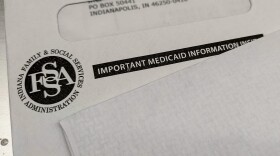-
Debate over property tax reform began in the second half of the legislative session Wednesday the same way it ended the first half – with local government leaders sounding the alarm on their budgets, while Gov. Mike Braun’s office pressed for taxpayer relief.
-
Lawmakers filed several bills to further restrict abortion access and strengthen reporting requirements in Indiana. Reproductive rights advocates said even though the bills didn’t move forward, they’re concerned lawmakers will continue to pursue the policies in the future.
-
Indiana lawmakers want to address Medicaid spending by overhauling the state’s Medicaid expansion program. However, testimony and discussion so far has included misinformation and misleading information on the Healthy Indiana Plan, or HIP. Medicaid experts and advocates break down the facts about the state and federal program.
-
The proposed legislation would allow the Indiana Department of Workforce Development to create a skills training pilot program, available for eligible Hoosiers on the state’s unemployment insurance program.
-
Several major Indiana election reforms advanced by the Senate Elections Committee this session either failed to get approval by the full Senate or were significantly scaled back.
-
Some traditional public school districts would be required to share referendum tax dollars with local charter schools under a controversial measure approved by lawmakers this week. After two days of heated debate, the bill was narrowly approved by Senate Republicans last week.
-
House Republicans advance their budget proposal. A controversial immigration bill quickly clears the House chamber. And a ban on transgender women competing in college sports heads to the Senate.
-
Indiana lawmakers want to address rising Medicaid costs in the state budget by overhauling the state’s Medicaid expansion program.
-
A Senate committee overhauls the property tax reform bill. A Medicaid reform bill advances to the full Senate. And a House committee approves a bill expanding access to birth control — but leaves several common forms out.
-
Lawmakers will be at the Indiana Statehouse this week as the 124th General Assembly reconvenes. During this longer session year, legislators will work to balance the state’s biennial budget.
© 2026 Louisville Public Media
Public Files:
89.3 WFPL · 90.5 WUOL-FM · 91.9 WFPK
For assistance accessing our public files, please contact info@lpm.org or call 502-814-6500
Public Files:
89.3 WFPL · 90.5 WUOL-FM · 91.9 WFPK
For assistance accessing our public files, please contact info@lpm.org or call 502-814-6500
Play Live Radio
Next Up:
0:00
0:00
Available On Air Stations









